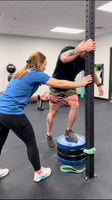Athletes of all levels strive to improve their performance while avoiding injuries that can set...
How Physical Therapy Can Help Athletes Recover from Concussions
Concussions are a serious and common injury among athletes, especially in contact sports like football, soccer, and basketball. While the immediate effects of a concussion are often visible, the long-term impact can be more subtle and require careful management. Physical therapy plays a key role in concussion recovery by addressing symptoms such as dizziness, headaches, and balance issues, and by ensuring a safe return to sports.
At Elevation Athletics Physical Therapy and Performance in Fort Worth, TX, we specialize in helping athletes recover from concussions through personalized care and rehabilitation programs. With Fort Worth physical therapy near me, athletes can recover fully and safely.
The Effects of a Concussion
A concussion occurs when a blow or jolt to the head causes the brain to move inside the skull, leading to various symptoms. Common effects of a concussion include:
- Headaches: Persistent headaches are a common symptom of concussion and can last for days or weeks after the injury.
- Dizziness and Balance Issues: Concussions can affect the vestibular system, leading to dizziness, balance problems, and difficulty with coordination.
- Cognitive Impairment: Memory issues, difficulty concentrating, and mental fog are often experienced after a concussion.
At Elevation Athletics Physical Therapy and Performance, our Fort Worth physical therapists work closely with athletes to address these symptoms and ensure a full recovery.

How Physical Therapy Helps Concussion Recovery
- Vestibular Rehabilitation for Dizziness and Balance: Physical therapists use vestibular rehabilitation techniques to help athletes regain balance and coordination. These exercises improve the function of the vestibular system, reducing dizziness and allowing athletes to return to normal activities safely.
- Head and Neck Mobility Exercises: Physical therapy includes exercises that target the neck muscles and spine to improve mobility and reduce tension. This is particularly helpful for athletes who experience headaches or neck pain following a concussion.
- Gradual Return-to-Play Program: Physical therapists guide athletes through a step-by-step return-to-play program, gradually increasing physical activity while monitoring for symptoms. This ensures that athletes don’t return to their sport too soon, reducing the risk of re-injury.
By addressing these key areas, physical therapy helps athletes recover fully from concussions and safely return to their sport.
From Our Blog:
Why You Want Out-of-Network Physical Therapy
Moms shouldn't do sit-ups...or should they?
The Benefits of Physical Therapy for Concussion Recovery
- Symptom Management: Physical therapy helps manage the common symptoms of concussion, such as headaches, dizziness, and balance issues, allowing athletes to recover more quickly and effectively.
- Improved Coordination and Balance: Through vestibular rehabilitation and balance exercises, physical therapy helps athletes regain coordination and stability, reducing the risk of further injury.
- Safe Return to Sports: One of the primary goals of physical therapy after a concussion is to ensure a safe return to sports. Physical therapists monitor symptoms and guide athletes through a gradual return-to-play program, ensuring that they are fully recovered before resuming competitive activity.
In addition to treating the physical effects of a concussion, physical therapy also helps athletes regain confidence and reduce the mental impact of the injury.
Customized Concussion Recovery at Elevation Athletics
At Elevation Athletics Physical Therapy and Performance, we believe in providing individualized care for each athlete. Our Fort Worth physical therapy clinic offers customized concussion recovery programs that address your specific needs and symptoms.
During your initial evaluation, our physical therapists will assess your balance, coordination, and neck mobility to develop a treatment plan tailored to your recovery. Whether you’re dealing with headaches, dizziness, or balance issues, we’ll provide the care and guidance you need to fully recover and return to your sport safely.
We also provide education on concussion management, helping athletes recognize the signs of a concussion and understand the importance of proper treatment.
Physical therapy plays a vital role in concussion recovery, helping athletes manage symptoms, regain balance, and safely return to sports. At Elevation Athletics Physical Therapy and Performance in Fort Worth, TX, we specialize in personalized concussion rehabilitation programs that support a full and safe recovery. If you’ve experienced a concussion and want to ensure a complete recovery, contact Fort Worth physical therapy near me today to schedule an evaluation.
Our experienced team is here to help you recover fully and get back to doing what you love.
Frequently Asked Questions
How does physical therapy help with concussion recovery?
Physical therapy helps manage concussion symptoms such as dizziness, headaches, and balance issues, while also guiding athletes through a gradual return-to-play program.
What are common symptoms of a concussion that physical therapy can address?
Common symptoms include headaches, dizziness, balance problems, and neck pain. Physical therapy provides targeted exercises to manage these symptoms and support recovery.
Can physical therapy prevent long-term effects of a concussion?
Yes, by addressing symptoms early and ensuring proper recovery, physical therapy can help prevent long-term complications such as chronic headaches or balance issues.
How long does it take to recover from a concussion with physical therapy?
Recovery time varies depending on the severity of the concussion and the individual’s progress, but many athletes see improvements within a few weeks to a few months of physical therapy.
Is physical therapy necessary for all concussions?
While not every concussion requires physical therapy, it can be highly beneficial for athletes experiencing lingering symptoms or those returning to a physically demanding sport.
%20(1).png?width=500&height=128&name=Elevation%20Atletics%20(3)%20(1).png)


